

Technology in Mediterranean and European Lands, 600–1600
by Pamela O. Long
 How medieval and Renaissance technology shaped Mediterranean and European society across a millennium.
How medieval and Renaissance technology shaped Mediterranean and European society across a millennium.
In Technology in Mediterranean and European Lands, 600-1600, Pamela O. Long explores the intricate web of technological advancements that shaped Mediterranean and European societies during the medieval and early modern periods. From the essential crafts of ploughing and tailoring to the sophisticated hydraulic systems and monumental building constructions, Long illuminates how ordinary people harnessed and transformed their world.
Drawing on recent scholarship on environmental history and the history of technology—as well as materials, object biographies, and the circulation of objects—Long examines the circulation of ideas and technologies in Europe and the Mediterranean. The book covers the evolution of food production, transportation, and communication, as well as the crafting of pottery, weapons, and machines. This in-depth historical analysis shows how these technological advancements had profound social and economic impacts on everyday life. Long’s meticulous research and engaging narrative bring to light the interconnectedness of various crafts and their contributions to the broader tapestry of human history.
By integrating archaeological findings, historical texts, and modern scientific methods, the book offers an interdisciplinary perspective on the technological practices of the pre-modern world. Perfect for scholars, students, and history enthusiasts, Technology in Mediterranean and European Lands, 600-1600 emphasizes the ingenuity and resilience of past civilizations and the enduring legacy of technological innovation.
ISBN 9781421451220 – 2025 – 296 pages
Technology in Southeast Asian History
by Suzanne Moon
 Explores the role of technology in the larger political and economic fabric of Southeast Asia.
Explores the role of technology in the larger political and economic fabric of Southeast Asia.
In Technology in Southeast Asian History, Suzanne Moon explores the profound entanglement of technology with Southeast Asian politics, social life, economics, and culture over its long history. Moon offers a unique framework for understanding the place of technology in this region and its pivotal role in the emergence of the modern technological world.
Synthesizing scholarship from the fields of history, archaeology, and anthropology, Moon examines and links technological stories from prehistory to the mid-twentieth century. She uses analytics in the history of technology—such as circulation, coproduction, and assemblage—to highlight the processes and evolving patterns of technological dynamism that characterize the region. Drawing on research focused on specific technologies, including temple construction, rice agriculture, weaving, and shipbuilding, Moon investigates the interconnectedness of these technologies within the larger political and economic fabric of Southeast Asian history.
In contrast with portrayals of Southeast Asia as technologically deficient, Moon demonstrates the richness of this region’s technological cultures. She rejects polarizing binaries such as traditional and modern or indigenous and foreign, instead underscoring Southeast Asia’s role as a dynamic cocreator of the modern technological world. Technology has contributed to the creation and disruption of social and political orders; shaped engagements across barriers of distance, culture, and language; and produced and reproduced diverse cultures in this region. This narrative of technological change offers students, scholars, and readers critical new perspectives on both technological history and Southeast Asian history.
ISBN 9781421446912 – 2023 – 208 pages
Delta of Power. The Military-Industrial Complex
By Alex Roland
 Does the Military-Industrial Complex as we understand it still exist? If so, how has it changed since the end of the Cold War?
Does the Military-Industrial Complex as we understand it still exist? If so, how has it changed since the end of the Cold War?
First named by President Dwight D. Eisenhower in his farewell address, the Military-Industrial Complex, originally an exclusively American phenomenon of the Cold War, was tailored to develop and produce military technologies equal to the existential threat perceived to be posed by the Soviet Union. An informal yet robust relationship between the military and industry, the MIC pursued and won a qualitative, technological arms race but exacted a high price in waste, fraud, and abuse. Today, although total US spending on national security exceeds $1 trillion a year, it accounts for a smaller percentage of the federal budget, the national GDP, and world military spending than during the Cold War. Given this fact, is the MIC as we commonly understand it still alive? If so, how has it changed in the intervening years?
In Delta of Power, Alex Roland tells the comprehensive history of the MIC from 1961, the Cold War, and the War on Terror, to the present day. Roland argues that the MIC is now significantly different than it was when Eisenhower warned of its dangers, still exerting a significant but diminished influence in American life. Focusing intently on the three decades since the end of the Cold War in 1991, Roland explains how a lack of cohesion, rapid change, and historical contingency have transformed America’s military-industrial institutions and infrastructure.
Roland addresses five critical realms of transformation: civil-military relations, relations between industry and the state, among government agencies, between scientific-technical communities and the state, and between technology and society. He also tracks the way in which America’s arsenal has evolved since 1991. The MIC still merits Eisenhower’s warning of political and moral hazard, he concludes, but it continues to deliver, by a narrower margin, the world’s most potent arsenal. An authoritative account of America’s evolving arsenal since World War II, Delta of Power is a dynamic exploration of military preparedness and current events.
Technology and the Environment in History
by Sara B. Pritchard and Carl A. Zimring
 New perspectives on how envirotech can help us engage with the surrounding world in ways that are more sustainable for humanity—and the planet.
New perspectives on how envirotech can help us engage with the surrounding world in ways that are more sustainable for humanity—and the planet.
Today’s scientists, policymakers, and citizens are all confronted by numerous dilemmas at the nexus of technology and the environment. Every day seems to bring new worries about the dangers posed by carcinogens, “superbugs,” energy crises, invasive species, genetically modified organisms, groundwater contamination, failing infrastructure, and other troubling issues.
In Technology and the Environment in History, Sara B. Pritchard and Carl A. Zimring adopt an analytical approach to explore current research at the intersection of environmental history and the history of technology—an emerging field known as envirotech. Technology and the Environment in History They discuss the important topics, historical processes, and scholarly concerns that have emerged from recent work in thinking about envirotech. Each chapter focuses on a different urgent topic:
Using five concepts to understand the historical relationships between technology and the environment—porosity, systems, hybridity, biopolitics, and environmental justice—Pritchard and Zimring propose a chronology of key processes, moments, and periodization in the history of technology and the environment. Ultimately, they assert, envirotechnical perspectives help us engage with the surrounding world in ways that are, we hope, more sustainable and just for both humanity and the planet. Aimed at students and scholars new to environmental history, the history of technology, and their nexus, this impressive synthesis looks outward and forward—identifying promising areas in more formative stages of intellectual development and current synergies with related areas that have emerged in the past few years, including environmental anthropology, discard studies, and posthumanism.
ISBN 9781421438993 – 2020 – 264 pages

Technology and Commercial Air Travel
by Rudi Volti
This volume explores the economic, political, cultural, and social events that propelled the technological advances of the airline industry. From more advanced airplanes to better security and safety, Volti delves into how the contributions of air travel have shaped the world that we live in today.
Rudi Volti is emeritus professor of sociology at Pitzer College and a founding member of the Science, Technology, and Society program of the Claremont Colleges. His publications include Technology, Politics, and Society in China (1982); Society and Technological Change (7th edition, 2014); The Engineer in History, with John Rae (2nd edition, 2001); The Facts on File Encyclopedia of Science Technology, and Society (2000); Technology and East Asian Economic Transformation (2002); Cars and Culture (2nd edition, 2005); and an introduction to the Sociology of Work and Occupations (2nd edition, 2012).
ISBN 9780872292130 – 2015 – 124 pages
Technology and Society in the Ancient Greek and Roman Worlds
by Tracey E. Rihll

This monograph provides an overview of the rapidly developing field of ancient Greek and Roman technology. It focuses on key technological achievements of the ancients in culturally critical domains and outlines recent work on those achievements, considering not only what we know but how we think we know it. It also concentrates on technologies that were well developed and economically significant. It includes chapters on the mechanisms of ancient economic productivity; the production, preservation, and distribution of food; the collection and distribution of water; public and private building construction; textiles; and mining and metallurgy. It is fully illustrated with color illustrations and contains a bibliographic essay. It is suitable for undergraduates, but also scholars in other fields who desire a sophisticated overview of the topic.
Tracey E. Rihllis a Reader in Ancient History at Swansea University, Wales, UK. She has studied, taught and written about a broad spectrum of ancient science and technology, as well as ancient slavery. Her books include Science and Mathematics in Ancient Greek Culture (Oxford: Oxford University Press, 2002); and Greek Science (Oxford: Oxford University Press, 1999). Her analysis of the most advanced mechanical technology in widespread production and use in antiquity, The Catapult, was published by Westholme in 2007. Her chapter, “Mechanics and Pneumatics” appeared in the Oxford Handbook of Greek and Roman Science and Medicine, edited by Paul Keyser and John Scarborough.
ISBN 978-0-87229-201-7 – 2013 – 92 pages
Technology and Communications in American History
by Gregory J. Downey
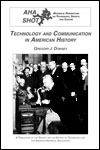
This 104-page monograph explores the history of communication technology in the United States from the colonial period to the present, including print culture, wired networks, broadcast communication, and the digital convergence of communication in cyberspace. Each new round of communication technology is situated within four overlapping historical themes: national integration, industrial urbanization, mass consumption, and global economic restructuring. Drawing upon both well-known and more recent scholarly work—from the historiography of technology, communication studies, information studies, and human geography—Greg Downey pays close attention not only to the state and the market as sources of technological innovation, but also to the audience and the laborer as key actors in technological adoption. Fully illustrated and with a comprehensive bibliography, this monograph is suitable for both students and faculty seeking an accessible but analytical introduction to the history of American communication technology.
Gregory J. Downey is a professor at the University of Wisconsin-Madison, where he is also the director of the School of Journalism and Mass Communication. Downey received his B.S. and M.S. in computer science from the University of Illinois, Champaign-Urbana, an M.A. in liberal studies from Northwestern University, and a joint Ph.D. in history of technology and human geography from Johns Hopkins University. He is the author of Closed Captioning: Subtitling, Stenography, and the Digital Convergence of Text with Television (Johns Hopkins University Press, 2008) and Telegraph Messenger Boys: Labor, Technology, and Geography, 1850-1950 (Routledge, 2002).
ISBN 978-0-87229-170-6 – 2011 – 104 pages.
Transportation Technology and Imperialism in the Ottoman Empire, 1800-1923
by Peter Mentzel

This monograph treats transportation technologies in the Ottoman Empire between c. 1800 and 1923. Focusing especially on steamships and railroads, it provides an introduction to the complex issues of imperialism and its relationship to technological development. It discusses the mixture of old and new technologies in the empire during the entire period. It treats the views and activities of three different groups–the Ottomans, European nations, and capitalist investors. Topics discussed include transportation technology and Ottoman security, as well as issues concerning industrialization and technology transfer. It contains an extensive bibliographic essay.
Peter Mentzel is a Senior Fellow at the Liberty Fund Inc., Carmel, Indiana. He has published extensively on the nineteenth and early twentieth century social and political history of the Balkans and the Ottoman Empire, and was guest editor of a special issue of Nationalities Papers on Muslim minorities in the Balkans (vol. 28, no. 1, March 2000). His most recent publications focus on the societal ramifications of the transfer of railroad technology into the Ottoman Empire. His grants have included a Fulbright Research Fellowship to Turkey (1998-99) and a grant from the American Research Institute in Turkey (1999).
ISBN 0-87229-146-4 – 2006 – 101 pages
Technology and Utopia
by Howard P. Segal
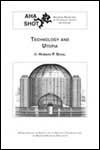
Segal examines the historical connection between technology and utopia, and shows how this connection is not just a contemporary western concept, but one that stretches back several centuries to Thomas More and also extends to several non-Western societies, including China and India. Segal illuminates how technology has been critical to the transformation of the conceptualization of utopia from “nowhere” to “somewhere” and, thanks to various high-tech developments, to the immediate future. This monograph also examines various expressions of utopia: prophecies, oratory, published works, political movements, world’s fairs, actual communities, and now cyberspace and “virtual” communities. Hardly an uncritical defender of utopia in any form, Segal nevertheless contends that utopia still serves positive purposes.
Howard P. Segal is Professor of History at the University of Maine, where he has taught since 1986. From 1996 to 2005 he was Bird Term Professor of History. He has been director of the Technology and Society Project since 1988. Segal received his M.A. and Ph.D. from Princeton University. His books include Technological Utopianism in American Culture (1985; 2nd ed. 2005); Future Imperfect: The Mixed Blessings of Technology in America (1994); Recasting the Machine Age: Henry Ford’s Village Industries (2005); and, with Alan Marcus, Technology in America: A Brief History (1989; 2nd ed. 1999). His articles and essays have appeared both in academic journals and in more general publications like the New York Times, the New Republic, the Chronicle of Higher Education, the American Scholar, and the Virginia Quarterly Review. He is a regular reviewer of books about technology for Nature.
ISBN 0-87229-147-2 – 2006 – 128 pages
Technology, Transport, and Travel in American History
by Robert C. Post
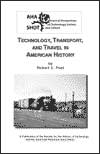
This monograph provides a concise history of transport and travel from the 15th century to the 21st, showing how change and innovation have been contingent on ambient social and cultural currents, and quite often on the outcome of contests over political power. It also illuminates a paradox: how frequently technological novelty is decoupled from any sound calculus of financial gain or public necessity. Canals and railways were constructed with only vague hopes that they could ever be profitable; autos and airplanes were invented with no clear sense of how people would construct their social reality. The analysis concludes with a suggestion that the absence of any inevitable link with rational motivation is what makes the history of technology such an instructive discipline. This 107-page monograph includes 30 illustrations, annotated endnotes, and a 12-page bibliography.
Robert C. Post is former curator of transportation at the Smithsonian Institution. He was editor of Technology and Culture from 1981 through 1995 and president of the Society for the History of Technology in 1997-98. He was also the founding co-editor and consulting editor for this series. He is the editor of Every Four Years: The American Presidency (rev. ed. 1984) as well as author or editor of several books on the relationship of technology and culture, including Physics, Patents, and Politics (1976), The Tancook Whalers (1986), In Context: History and the History of Technology (with Stephen H. Cutcliffe, 1989), Street Railways and the Growth of Los Angeles (1990), Yankee Enterprise (with Otto Mayr, rev. ed. 1995), and High Performance: The Culture and Technology of Drag Racing (rev. ed. 2001).
ISBN 0-87229-131-6 – 2003 – 107 pages
Technology and Society in the Medieval Centuries. Byzantine, Islam, and the West, 500-1300
by Pamela O. Long

Pamela Long considers the ways in which different medieval cultures, from the Byzantine empire to northern Europe, adopted and transformed technologies according to their own needs. Long introduces readers to recent scholarship and to some of the significant issues in the historiography of medieval technology.
ISBN 9780872291324 – 2003 – 107 pages
Technology Transfer and East Asian Economic Transformation
by Rudi Volti
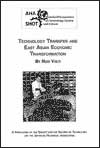
This monograph addresses the extraordinarily high level of economic dynamism in four countries of Southeast Asia. Japan was the first nation outside Europe and North America to industrialize, and many of its achievements have been duplicated by South Korea, Taiwan, and China. In their pursuit of economic modernity, these countries actively sought, modified, and applied technologies that were obtained from abroad. Here is a narrative and analysis of technology transfer to East Asia, taking note of key institutional actors, both private and public, as well as the distinctive historical circumstances that shaped the acquisition and assimilation of foreign technologies. It concludes with a discussion of the complex nature of the “East Asian Model” of foreign technology acquisition and use, as well as an annotated bibliography to aid readers interested in doing further research.
Rudi Volti is professor of sociology at Pitzer College and a founding member of the Science, Technology, and Society program of the Claremont Colleges. He also serves on the editorial board of Technology and Culture. His major publications include Technology, Politics, and Society in China (1982), Society and Technological Change (first published in 1995 and now in its fourth revised edition), The Engineer in History (1993), and The Encyclopedia of Science, Technology, and Society (1999).
ISBN 0-87229-127-8 – 2002 – 66 pages
The Military-Industrial Complex
by Alex Roland
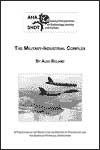
This monograph analyzes a set of relationships central to American history in the latter 20th century, which entered popular discourse in a phrase used by Dwight D. Eisenhower in his farewell address of 1961–the military-industrial complex. The phrase attracted little attention at the time, but achieved great political salience during the Vietnam war. Here, the analysis begins with an overview of U.S. industry and the military between World War I and the 1990s and then focuses on five transformations: civil-military relations, relations between industry and the state, among government agencies, between scientific-technical communities and the state, and between technology and society. A concluding bibliographic essay addresses the salient literature and identifies areas of controversy among historians.
Alex Roland is emeritus professor of history at Duke University, where he taught military history and the history of technology. He is a past secretary and past president of the Society for the History of Technology. His books include Underwater Warfare in the Age of Sail (1978), Model Research: The National Advisory Committee for Aeronautics (1985), Strategic Computing: DARPA and the Quest for Machine Intelligence (with Philip Shiman, 2002), and, with Richard Preston and Sidney Wise, Men in Arms: A History of Warfare and Its Interrelationships with Western Society (5th ed., 1991).
ISBN 0-87229-124-3- 2001 – 64 pages
Technology and Society in Ming China, 1368-1644
by Francesca Bray
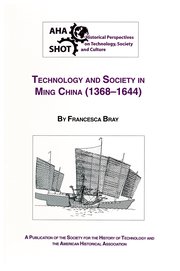 This pamphlet approaches the material world of the Ming from a more anthropological perspective than has been conventional among historians of China, emphasizing the role of technologies in social order and identity.
This pamphlet approaches the material world of the Ming from a more anthropological perspective than has been conventional among historians of China, emphasizing the role of technologies in social order and identity.
ISBN: 9780872291195 – 2000 – 89 pages
Technology, Society, and Culture in Late Medieval and Renaissance Europe, 1300-1600
by Pamela O. Long
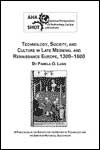
This monograph treats both traditional and innovative technologies, the topics including agriculture and food production, the wool textile industry, painting and sculpture, architecture and building construction, mining, metallurgy, timekeeping, and printing. One key theme involves the relationship of labor, gender, and the status of craft work, another addresses issues of invention and the value of novelty. This 77-page monograph, which includes 17 illustrations and a nine-page bibliography of both primary and secondary sources, provides an excellent introduction to the material and technological bases of Renaissance culture.
Pamela O. Long is an independent historian of late medieval and early modern Europe and of the history of science and technology. Her books include Openness, Secrecy, Authorship: Technical Arts and the Culture of Knowledge from Antiquity to the Renaissance (2001); Artisan/Practitioners and the Rise of the New Sciences (2011); and Engineering the Eternal City: Infrastructure, Topography, and the Culture of Knowledge in Late Sixteenth-Century Rome (2018). She is a Catherine T. and John D. MacArthur Fellow.
ISBN 0-87229-120-0 – 2000 – 76 pages
See also: